Ethiopian Climate Change Working Group (ECCWG) Launched
The Ethiopian Climate Change Working Group (ECCWG) lunching workshop was held here in Addis Ababa, Ethiopia, at the International Livestock Research Institute (ILRI), on January 26, 2023. The event was organized by the African Center of Excellence for Water Management (ACEWM), Addis Ababa University, and supported by ILRI-Ethiopia. The goal of the workshop was to officially commence and establish successful partnerships with the key stakeholder institutions to enable the ECCWG to realize its vision, mission, objectives, and implementation plans through a strong and collaborative approach.

The proceedings of the event commenced with an inaugural ceremony on the afternoon of Thursday, January 26, which was presided over by Prof. Abebe Getahun, representing the dean of the College of Natural and Computational Sciences, Addis Ababa University. In his welcoming speech, Prof. Abebe extended his warm greetings to the attendees and emphasized that the workshop offered a unique opportunity for sharing experiences. He went on to add that climate change constitutes a severe menace to the planet, particularly to developing nations like Ethiopia. He also highlighted that climate change risks cannot be managed by a single entity, and a collective effort is essential.
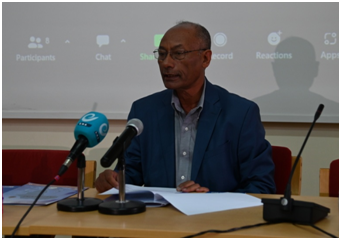
Prof. Feleke Zewge, who is the executive director of the African Center of Excellence for Water Management (ACEWM) and the chair of ECCWG, presented an overview of the working group and its objectives during the workshop. He emphasized that the primary objective of the event was to inaugurate the working group officially and to engage with stakeholders in addressing the multifaceted challenges and opportunities presented by climate change.
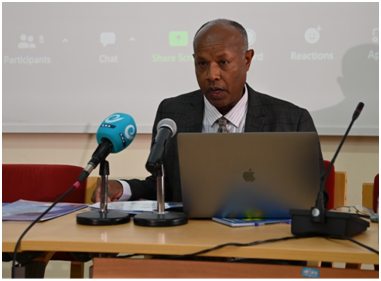
Feleke stated that climate change is a major factor contributing to the loss of biodiversity, which consequently leads to an increased risk of pathogens, food insecurity, and a decline in human wellbeing. Additionally, he emphasized that water management is a crucial development challenge facing not only Ethiopia, but also Africa as a whole. He highlighted that developing countries rely heavily on water for their growth and development, and further revealed that the area experiencing water shortages in Sub-Saharan Africa will increase by 29% by the year 2050. He elaborated that Ethiopia has launched the Climate Resilient Green Economy (CRGE) initiative in 2011 and is currently implementing climate actions with the aim of protecting the country from the adverse effects of climate change and building a green economy by reducing greenhouse gas (GHG) emissions.
Dr. Mensur Dessie, the delegate of H.E Dr. Getahun Garedwu, Director General of Environmental Protection Authority, delivered an opening speech. He highlighted that Ethiopia, and the eastern Africa region are currently grappling with the consequences of climate change, and the government is taking proactive measures to adapt to the inevitable reality of climate change, which is predicted to intensify in the future. He also mentioned that the government has implemented the Nationally Adaptation Plans (NAPs) and Climate Resilient Green Economy (CRGE) strategies to mitigate the susceptibility of the population, environment, and economy to the unfavorable effects of climate change. He emphasized that climate issues should be viewed as technical matters that require professional attention to manage the associated risks. Dr. Mensur concluded his speech by urging all individuals and organizations to work together and collaborate in fighting against the risks posed by climate change.
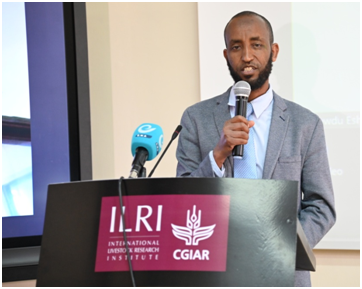
Dr. Zewudu Eshetu delivered a keynote and plenary session in which he provided an overview of climate change, its causes, and consequences. He explained the concepts of climate change and global warming, as well as climate anomalies and the major threats that are triggered by climate change. He also discussed global and national policies that have been implemented to address these threats, and the potential opportunities for nurturing national development goals while simultaneously achieving global climate targets. Additionally, he explored the commitments made by Annex 1 and 2 countries towards a common goal of the Paris Agreement Conclusions and presented plausible mechanisms for meeting the temperature objectives set by the Paris Agreement.

He also presented on the topic of greenhouse gas (GHG) emissions and the global threats of warming, highlighting that our planet is experiencing warming and changing climates, largely due to human activities that have caused the accumulation of greenhouse gases in the atmosphere. He stated that the Earth is currently around 1.1°C warmer than it was in the late 1800s, and that GHG emissions-induced climate anomalies have led to more intense droughts in the Sahel and Ethiopia. He further explained that the changes in climate, including increasing temperatures, disrupt weather patterns and cause extreme weather events, which in turn increases the risk of irreversible changes to biodiversity, water and ecosystems.

Many other presentations also held on virtual zoom space by Dr. Samuale Tesfaye, University of Göttingen, Germany on adaptation to climate change in the water and energy sector, followed by Mr. Tarekegn Argaw, a member of the Geospatial and Biometric Research team at the Ethiopian Institute of Agricultural Research (EIAR) on climate change, agriculture &food security: challenges and opportunities and finally Dr. Tassew Mekuria, who is affiliated with Baltimore City Community College and Morgan State University in the United States and members of ECCWG on climate change, environment, and natural resources. The presentations followed by questions, comments and warmer discussion among participants in the Workshop.
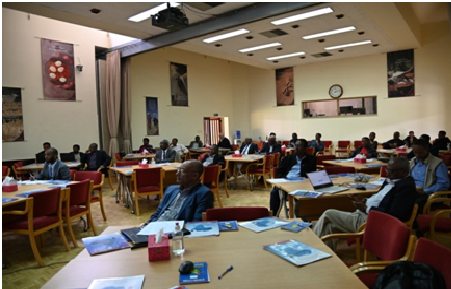
In the concluding session Prof. Felek Zewge, Chair of the ECCWG and Director of the ACEWM, thanked all participants for their active participation and discussion in the workshop. In his closing words, he spoke about the purpose of the workshop and the next activities of the ECCWG. He said that the discussions and exchanges that took place during this introductory workshop were important to know the goal of the ECCWG and to understand how the ECCWG works and what the ECCEG is planned to do. He further described that the ECCWG will develop a detailed action plan indicating time and responsibility and that the group will organize a stakeholder workshop to discuss the proposed action plan and get more input.
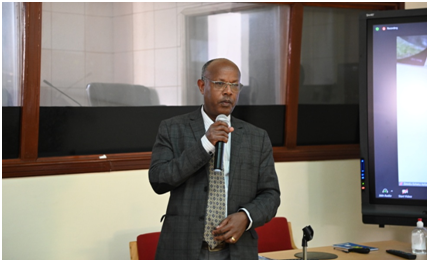
He stressed the need to develop useful and actionable proposals to secure more funding. He encouraged that there is a green light for climate change funding and that the Ethiopian government is positive about supporting projects related to climate change. He further noted that the group should develop problem-solving projects that reduce the country and region’s vulnerability to current and future climate risks.Prof. Feleke also pointed out that the effective leadership and coordination of the various three thematic areas of the ECCWG play a crucial role in making the group functional and having an impact on climate change adaptation and mitigation in Ethiopia and the region.
Finally, he once again thanked all participants, organizers and the ACEWM. He promised to meet again at the next meeting to discuss ECCWG action plans and wished all participants to return home.

